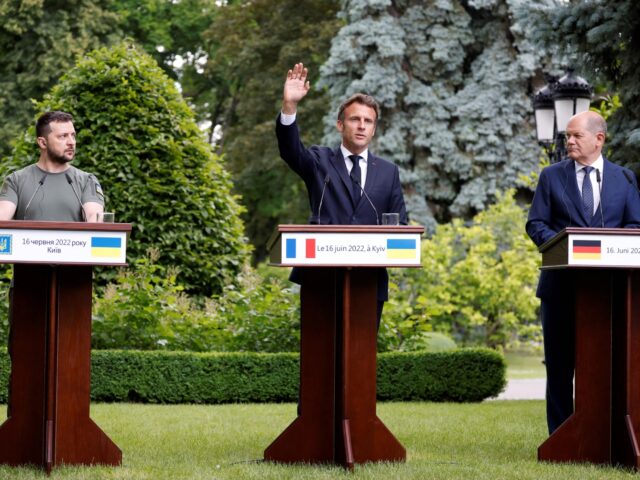The government of French President Emmanuel Macron is reportedly set to back NATO membership for Ukraine, signalling a growing divide in the Western strategy towards Russia.
In a potential break with Berlin and Washington, Paris once again seems intent on forging its own strategy towards the war in Ukraine, with reports indicating that the Elysée Palace is now prepared to back the war-torn country’s membership in the North Atlantic Treaty Organization ahead of the annual NATO summit set to be held in the Lithuanian capital of Vilnius in July.
According to a report from the French daily newspaper Le Monde, a French Defense Council meeting on June 12 determined that backing Ukraine’s membership into the military alliance would be beneficial as a “means of influencing the conflict and bringing Moscow and Kyiv to the negotiating table.”
Paris, which is also in favour of Ukraine entering the European Union, sees NATO membership as the “security guarantee” that would be necessary for President Volodymyr Zelensky to come to the negotiating table with Moscow on a possible peace deal following the Summer counteroffensive.
France’s reported stance on NATO membership — which Vladimir Putin has long declared as a red line for the Kremlin — is a departure from previous opinions expressed by President Emmanuel Macron, who said in December of last year: “Ukraine’s entry into NATO would be perceived by Russia as something confrontational. You can’t imagine it with this kind of Russia.”
The change also appears to be setting up a divide in Western strategy, with both Germany and the United States being more hesitant to back Ukraine joining the American-led alliance, at least until the war is already over, compared to former Soviet bloc states in Eastern Europe.
This will likely remain the case until the end of the war at least, given that Article 5 of the NATO treaty would require the U.S. military and other alliance members to directly enter the war to defend Ukraine, thereby trigging a direct conflict between the world’s two largest nuclear powers.
“The French position is now closer to that of Poland than Germany,” a French diplomat told the newspaper.
German Chancellor Olaf Scholz said on Sunday that Ukraine currently does not meet the requirements to join the NATO military alliance. https://t.co/ELkFSfcsKs
— Breitbart News (@BreitbartNews) May 22, 2023
German Chancellor Olaf Scholz, in an apparent rebuke of his counterpart in Paris, told Bundestag parliamentarians in a Berlin speech on Thursday that NATO leaders should “soberly” approach the concept of Ukrainian membership and that it is “out of the question” as long as the war continues.
“Therefore, I advocate that we focus in Vilnius on what is now an absolute priority: Namely, to strengthen the real fighting power of Ukraine,” Scholz said according to POLITICO, adding that leading G7 countries should look to establish security guarantees in the form of continued Western arms shipments to the country.
President Joe Biden, while not shutting the door, said that Washington will not back an expedited membership bid and that Ukraine should not receive special treatment in terms of meeting the requirements for a state to join the alliance, potentially raising issues surrounding corruption in the country.
“I think it will. I think it can, but it’s not automatic,” Biden said of Ukraine’s chances of joining NATO last weekend in Philadelphia.
Despite previous indications from the White House that the 80-year-old Democrat would be “open to” removing some NATO requirements, such as the Membership Action Plan, Biden walked back the idea, saying that Ukraine has “to meet the same standards. So we’re not going to make it easy.”
Macron: I Should Have Listened to Eastern Europe Regarding Reality of Russian Threat https://t.co/N1DmDS1sAz
— Breitbart London (@BreitbartLondon) June 2, 2023
Even if Kyiv could meet the requirements and is able to come to a detente with the Kremlin, Ukraine still faces a steep road ahead in order to join the Western military alliance. Given that membership requires the unanimous consent of all current members — see Turkey holding up Sweden’s membership bid over a political disagreement — relations between Hungary and Ukraine would likely come to the fore.
Ties have long been fractious at best between Budapest and Kyiv, with the government of Viktor Orbán long denouncing the poor treatment of ethnic Hungarians in the Transcarpathia region of Ukraine, who were cut off from the rest of Hungary following the Great War.
More recently, Hungary — which is heavily reliant on gas imports from Russia — has accused the Zelensky government of “behaving more and more hostile towards Hungary” in the wake of reports indicating that Kyiv was plotting a potential strike against the Druzhba oil pipeline that connects Russia to Hungary.
In April, outgoing NATO Secretary General Jens Stoltenberg claimed that all “NATO allies have agreed that Ukraine will become a NATO member.” Responding to the news on Twitter, Orbán curtly wrote: “What?!”, indicating the deal is far from done.
Hungarian Prime minister Viktor Orbán shot down claims from NATO chief Jens Stoltenberg that “all members” agreed on allowing Ukraine to join the alliance. https://t.co/aehugy8EbK
— Breitbart News (@BreitbartNews) April 23, 2023

COMMENTS
Please let us know if you're having issues with commenting.